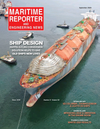
Page 17: of Maritime Reporter Magazine (September 2020)
Marine Design Annual
Read this page in Pdf, Flash or Html5 edition of September 2020 Maritime Reporter Magazine
dustry organizations of piston deposit accommodate alternative fuels, engine phenomena will allow us to formulate issues as well as liner scuf? ng, with designs will change. New hardware lubricant additives enabling necessary one of those reports pointing toward the modi? cation, as well as new materials. wear protection. This will be the case legacy 40BN lubricants as being the is- “We must consider the impact this will for whichever alternate fuels make up sue,” said Tarrant. “If I go back to the have on the lubricant performance re- the palette of options being explored ? nding from (Lubrizol’s) early studies, quirements,” said Tarrant. “Lubrizol’s ultimately to replace fossil-based liquid we were able to reaf? rm that those ex- R&D in understanding these various diesel of today.” isting legacy lubricants would not be adequate to provide protection required, and that more advanced solutions were needed to tackle those problems with- out returning to higher BN lubricants.”
Tarrant said that using those higher
BN lubricants does, in the short term, aid piston cleanliness, “but long-term use can and does lead to over-lubri- cation issues that manifest additional problems, such as turbocharger depos- its and wear, as well as after-treatment deposit fouling.”
That research clearly showed a link between piston cleanliness deposit and the lubricant’s ability to cope with that combustion phenomena from the VLS-
FOs. “In the case of scuf? ng, there could be a number of factors involved, and investigation is required to understand the root cause,” said Tarrant. “Once the root cause is fully understood, appropri- ate robust wear protection within addi- tives, can and will be used to combat those (issues).”
Future Fuels “The shipping industry is clearly looking toward new alternative fuels as a key solution in moving toward decarbonization,” said Tarrant. “Each alternative fuel will likely have differ- ent inherent characteristics, and will likely manifest differently in the engine operation, particularly the combustion cycle.” Lubrizol is not conducting its investigations in a vacuum – and is the ? rst lubricant additive technology sup- plier to join the Getting to Zero Coali- tion, an international group composed of more than 100 organizations aiming to drive the development of commer- cially viable, zero-emissions deep-sea ships by 2030. As OEMs look to in- crease ef? ciency performance and/or www.marinelink.com 17
MR #9 (1-17).indd 17 9/9/2020 7:46:15 AM

 16
16

 18
18
